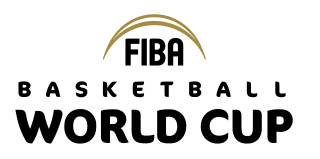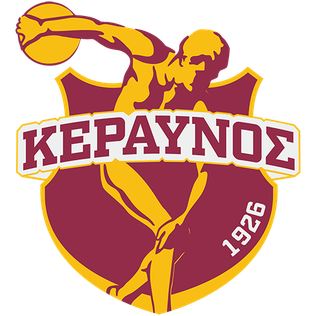The EuroLeague, known as the Turkish Airlines EuroLeague for sponsorship reasons, is the top-tier European professional basketball club competition, organized by Euroleague Basketball since 2000.

The FIBA Basketball World Cup, also known as the FIBA World Cup of Basketball or simply the FIBA World Cup, between 1950 and 2010 known as the FIBA World Championship, is an international basketball competition contested by the senior men's national teams of the members of the International Basketball Federation (FIBA), the sport's global governing body. It is considered the flagship event of FIBA.

Keravnos B.C., also known as Keravnos Strovolou, is a professional basketball club based in Strovolos, Nicosia, Cyprus. The plays its home games in the Costas Papaellinas Arena, which has a capacity of 2,000 spectators.

The EuroLeague Women is the highest professional basketball league in Europe for women's clubs.
The Lithuania women's national basketball team represents Lithuania in international women's basketball competitions. They are regulated by the Lithuanian Basketball Federation, the governing body for basketball in Lithuania.

The FIBA Intercontinental Cup, also commonly referred to as the FIBA World Cup for Champion Clubs, or the FIBA Club World Cup, is a professional basketball competition that is endorsed by FIBA World and the NBA. Historically, its purpose has been to gather the premier basketball clubs from each of the world's geographical zones, and to officially decide the best basketball club of the world, which is officially crowned as the world club champion. The World Cup for Clubs has been contended mainly by the champions of the continents and/or world geographical regions that are of the highest basketball levels.

Galatasaray is the women's basketball section of Galatasaray S.K., a major sports club in Istanbul, Turkey.
Basketballin Greece erupted with the senior men's Greek national team's win at the 1987 EuroBasket in Athens, which caused a general basketball euphoria in the country. Since then, men's Greek national teams have achieved consistent international success, leading Greece to join Russia, Serbia, Croatia, Italy, Spain, France, and Lithuania in the circle of European basketball powers. In addition to the national team's triumph in 1987, Greece also won the gold medal at the 2005 EuroBasket, silver medals at the 1989 EuroBasket, and the 2006 FIBA World Cup, as well as the bronze medal at the 2009 EuroBasket.
Professional basketball clubs in Europe can compete in a number of different competitions, including national leagues, regional (multi-national) leagues, and continental competitions. It is therefore possible for clubs from some countries to take part in multiple levels of competition in the same season. Clubs usually qualify for European competitions through performance in their national or regional leagues, with exception of wild cards.
The 1994–95 FIBA Women's European Champions Cup was the 37th and second-to-last edition of FIBA Europe's international competition for women's basketball national champion clubs. It ran from 7 September 1994 to 23 March 1995.
The 1995–96 FIBA Women's European Champions Cup was 38th and final edition of the competition, which was refounded the following year as Euroleague Women. It ran from 6 September 1995 to 21 March 1996.
The 1968–69 FIBA Women's European Champions Cup was the eleventh edition of FIBA's competition for women's basketball national champion clubs, running from November 1969 to April 1970. Daugava Riga defeated Wisła Kraków, which became the first Polish team to reach the final, to win its seventh title in a row. Albania withdrew from the competition.
The 1970–71 FIBA Women's European Champions Cup was the twelfth edition of FIBA Europe's competition for women's basketball national champion clubs, running from November 1970 to April 1971.
The 1971–72 FIBA Women's European Champions Cup was the twelfth edition of FIBA Europe's competition for women's basketball national champion clubs, running from October 1971 to April 1972. The group stage was expanded from six to eight teams.
The 1975–76 FIBA Women's European Champions Cup was the 18th edition of FIBA Europe's competition for women's basketball national champion clubs, running from October 1975 to March 1976. The Soviet Union didn't take part in the competition, ending Daugava Riga's record 12-year winning streak, and Sparta Prague defeated Clermont UC in the last final played as a two-legged tie to become the first Czechoslovak team to win the trophy.

The 1997–98 FIBA EuroLeague was the 41st installment of the European top-tier level professional club competition for basketball clubs. It began on September 18, 1997, and ended on April 23, 1998. The competition's Final Four was held at Palau Sant Jordi, Barcelona, with Kinder Bologna defeating AEK in the EuroLeague Final, in front of 11,900 spectators.
The 1996–97 FIBA EuroLeague was the 40th installment of the European top-tier level professional club competition for basketball clubs. It was organized by FIBA Europe. It began on September 19, 1996, and ended on April 24, 1997. The competition's Final Four was held at Rome.

The FIBA Europe Cup, officially abbreviated as FEC is an annual professional club basketball competition organised by FIBA for eligible European basketball clubs. It is the European-wide second level. Clubs mainly qualify for the competition based on their performance in their national leagues and cup competitions, although this is not the sole deciding factor, as sometimes clubs that did not win their league can still qualify.

AEK Basketball Club, also known as AEK B.C. or AEK, and more commonly known in European competitions as AEK Athens, is a Greek professional basketball club based in Athens, Greece, part of the major multi-sport club AEK. The club was established in Athens in 1924 by Greek refugees from Constantinople in the wake of the Greco-Turkish War (1919–1922).
The 1988–89 FIBA Women's European Champions Cup was the 31st edition of FIBA Europe's competition for national champions women's basketball clubs, running from September 1988 to 22 March 1989. The final featured clash between earlier 1987-88 season reigning champion Primigi Vicenza from Viceza (Italy) and third place Jedinstvo Aida from Tuzla. Jedinstvo Aida won a final game played in Florence for the first time in club's history, to become the second YU club to win the competition. Dynamo Novosibirsk and Astarac Mirande came third and fourth respectively.







